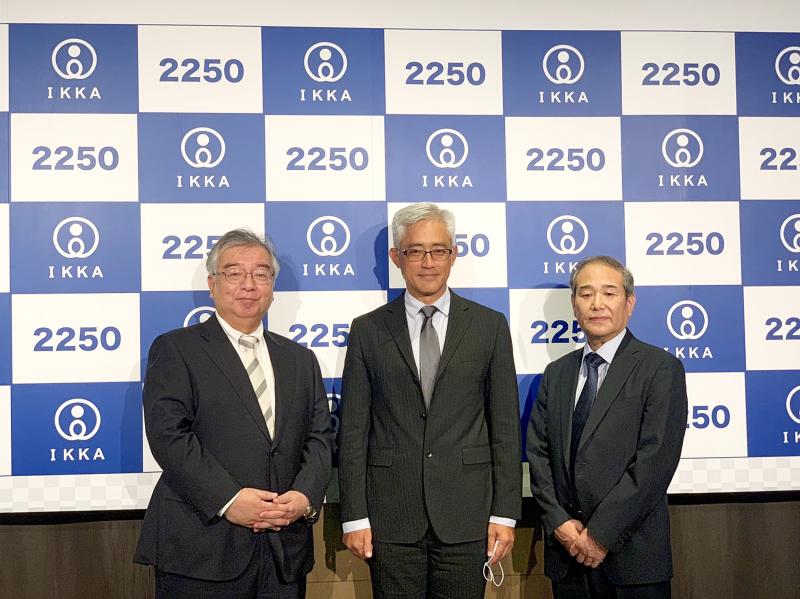IKKA Holdings (Cayman) Ltd (第一化成控股), a maker of precision plastic injection molded components, is expected to become the first Japanese company to launch a primary listing in Taiwan, with its Taiwan Stock Exchange (TWSE) listing scheduled for May 31, the exchange said.
IKKA Holdings registered in the British Cayman Islands in March 2016. Its major operations are in Japan, as it is an electric vehicle parts supplier to large Japanese automakers.
For the listing, IKKA Holdings is planning to issue 5 million new shares and has tentatively set an issuance price of NT$76, with 15 percent of the shares to be reserved for its employees.

Photo: Lin Jin-hua, Taipei Times
For the underwriting process, an auction was scheduled from yesterday to tomorrow with a floor price of NT$66.09, and the bidding results are expected to be announced on Monday, the TWSE said.
Concord Securities Co (康和證券) and First Securities Inc (第一金證券) would serve as the underwriters for the listing.
Auto parts account for 60.9 percent of IKKA Holdings’ total sales, with Japanese firms such as Toyota Motor Corp, Honda Motor Co and Nissan Motor Co its major customers, the company has said.
IKKA Holdings is also a supplier of toilet and bathroom equipment, and automation machinery. Japan’s Sumitomo Corp, Aisin Seiki Co and Toto Ltd are among the company’s top three customers, while Germany’s Bosch AG is the major buyer of its automation machinery.
IKKA Holdings produces electronic parking brakes and toilet and bathroom items in Japan and China, manufactures relay boxes in Vietnam and makes automation machinery parts in Malaysia.
IKKA Holdings posted earnings per share (EPS) of NT$5.20 last year on sales of NT$3.62 billion (US$129.5 million), compared with EPS of NT$5.93 in 2019 and NT$4.19 in 2018.
In the first four months of this year, it reported NT$1.269 billion in consolidated sales, up 17.12 percent from a year earlier, while its sales for last month soared 20 percent annually to NT$306 million.

Taiwan Semiconductor Manufacturing Co (TSMC, 台積電) secured a record 70.2 percent share of the global foundry business in the second quarter, up from 67.6 percent the previous quarter, and continued widening its lead over second-placed Samsung Electronics Co, TrendForce Corp (集邦科技) said on Monday. TSMC posted US$30.24 billion in sales in the April-to-June period, up 18.5 percent from the previous quarter, driven by major smartphone customers entering their ramp-up cycle and robust demand for artificial intelligence chips, laptops and PCs, which boosted wafer shipments and average selling prices, TrendForce said in a report. Samsung’s sales also grew in the second quarter, up

LIMITED IMPACT: Investor confidence was likely sustained by its relatively small exposure to the Chinese market, as only less advanced chips are made in Nanjing Taiwan Semiconductor Manufacturing Co (TSMC, 台積電) saw its stock price close steady yesterday in a sign that the loss of the validated end user (VEU) status for its Nanjing, China, fab should have a mild impact on the world’s biggest contract chipmaker financially and technologically. Media reports about the waiver loss sent TSMC down 1.29 percent during the early trading session yesterday, but the stock soon regained strength and ended at NT$1,160, unchanged from Tuesday. Investors’ confidence in TSMC was likely built on its relatively small exposure to the Chinese market, as Chinese customers contributed about 9 percent to TSMC’s revenue last

LOOPHOLES: The move is to end a break that was aiding foreign producers without any similar benefit for US manufacturers, the US Department of Commerce said US President Donald Trump’s administration would make it harder for Samsung Electronics Co and SK Hynix Inc to ship critical equipment to their chipmaking operations in China, dealing a potential blow to the companies’ production in the world’s largest semiconductor market. The US Department of Commerce in a notice published on Friday said that it was revoking waivers for Samsung and SK Hynix to use US technologies in their Chinese operations. The companies had been operating in China under regulations that allow them to import chipmaking equipment without applying for a new license each time. The move would revise what is known

UNCERTAINTY: A final ruling against the president’s tariffs would upend his trade deals and force the government to content with billions of dollars in refunds The legal fight over US President Donald Trump’s global tariffs is deepening after a federal appeals court ruled the levies were issued illegally under an emergency law, extending the chaos in global trade. A 7-4 decision by a panel of judges on Friday was a major setback for Trump, even as it gives both sides something to boast about. The majority upheld a May ruling by the Court of International Trade that the tariffs were illegal. However, the judges left the levies intact while the case proceeds, as Trump had requested, and suggested that any injunction could potentially be narrowed to apply